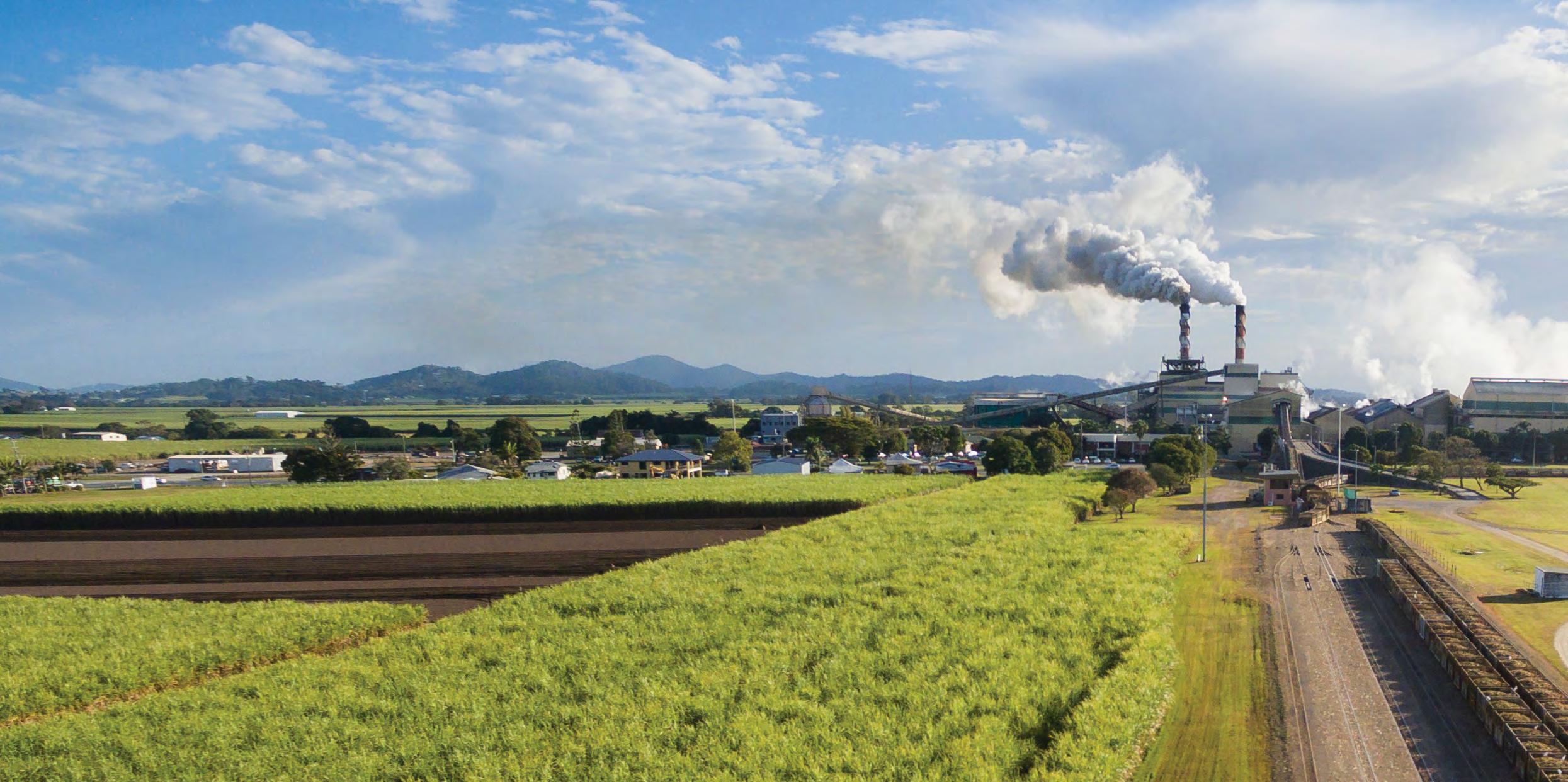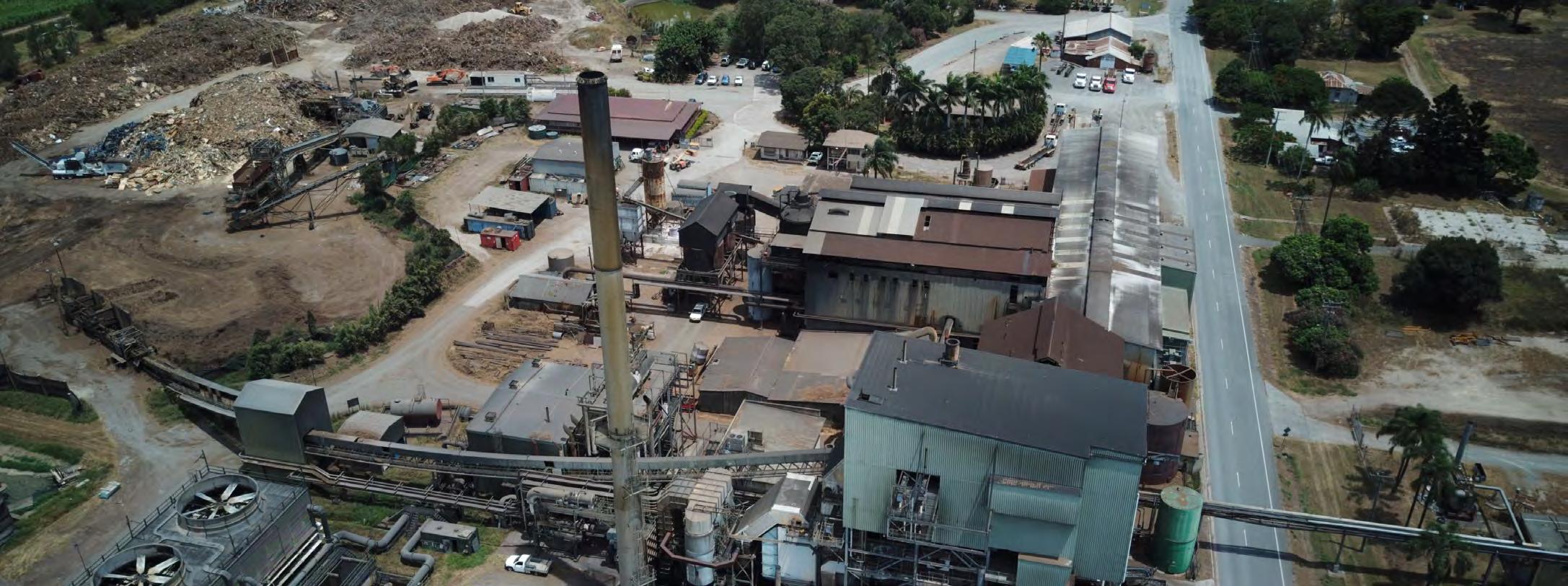
9 minute read
CHRISTMAS CRUSH
By Robyn Devine and Kirili Lamb
Race to get crop off continues
Advertisement
Growers supplying the Mulgrave Mill became the first to cut out this season, ending their harvest with a sigh of relief on 17 November. Unfortunately, for growers further south the news isn't so sweet, with the end of this year's crush still many weeks away.
Despite getting off to an optimistic start, the 2022 has been a challenging season for Queensland’s sugarcane growers.
While the world sugar price has remained high, providing a positive story for the industry, challenges with wet weather, workforce shortages, and poor mill performance have plagued the season and left growers feeling frustrated and anxious.
Widespread rain events in June left paddocks soggy and inaccessible.
It was a double-whammy for growers, with the unseasonable wet weather not only delaying the crush across a number of districts, but also boosting the size of the crop, leaving more cane to cut in a shorter window.
This effectively ensures a late finish in many areas, however the problem has been compounded by ongoing mill performance issues with some districts now staring down the barrel of a midJanuary finish.
PROSERPINE
Wet weather played its part in disrupting Proserpine’s crush, with 450 hours or 19 days officially lost due to rain so far this season. This comes on top of a late start to the crush due to a disrupted maintenance program caused mainly by supply chain issues relating to critical capital expenditure projects.
Retro-fitting of a new mud filter caused considerable delays at the start and the loss of experienced permanent staff during the maintenance season was another challenge, along with difficulties recruiting casual labour for the commencement of the crushing season.
As at the end of Week 21, the mill was 400,000 tonnes behind budget, which equates to approximately five weeks crushing, therefore, lost time is split 50/50 between wet weather and mechanical issues.
On the positive side, CANEGROWERS Proserpine District Manager Mike Porter says communication with the mill has improved greatly during the season with regular updates provided by senior milling executives and superintendents.
PLANE CREEK
In both Plane Creek and Mackay milling districts the harvest got away to a delayed start over mid-June and that delay set a pattern for the remainder of the crush.
For Plane Creek, wet weather further held off a start, while mechanical issues gave Mackay Sugar’s three mills at Farleigh, Marian, Racecourse a rough leading edge into the crush.
Concerns about the impact of a late finish to the 2021 harvest on Mackay Sugar’s maintenance schedule the slack had been expressed by CANEGROWERS Mackay towards the end of 2021.
These concerns were borne out by Marian Mill’s unreadiness to commence operations, finally leading out on one train only and technical issues at the mills.
Unseasonal rain events in May and July created some issues around cane supply in both milling districts. July’s event delivered over 170mm in some areas, causing stoppages of between seven and 14 days.
The rain may have halted production, but it also brought on a significant boost of around 100,000 to 200,000 tonnes to crop estimates for the year, meaning that the goal posts significantly shifted as to when the mills would call end-of crush. Currently, it is expected that mills will finish in early to mid-January, dependent on cane quality and the onset of the Wet.
CANEGROWERS Mackay Chairman Kevin Borg (pictured), a Plane Creek area grower, said the mill had performed better so far this season compared to past years.
“An availability figure in excess of 85% has been achieved to date, making this a better year for performance than in many past years,” Mr Borg said.
“We are crushing into early January as a result of a large crop that has been grown on the back of a reasonable wet season as well as intermittent rain through the crush period. To date estimates continue to increase quite substantially.
“A lower than usual sugar content has aided Plane Creek Mill in their efforts to crush the crop. In past years, high CCS levels have impacted crushing rates as a result of low capacity in the backend of the milling process.”
Wilmar’s Sarina Regional Operations Manager Pieter Van Vuren agreed that wet weather had caused significant delays for Plane Creek Mill.
“As at 11 November, more than three weeks of crushing time had been lost to wet weather since the start of the season,” Mr Van Vuren said.
“The mill has performed well over the season to date with consistent throughput week to week. The main challenges have been from wet weather and labour shortages.
“We’ve placed a strong focus on maximising crush rate and prioritising targeted maintenance during cane supply stops, in order to keep availability up. Mill reliability has been good, with season-todate availability currently 86.3 per cent.”
Mr Van Vuren said the milling district’s crop continued to cut above the estimate. Initial estimates were at 1.3Mt but have been adjusted incrementally over the season to 1.5 then 1.6Mt. The miller expects that based on throughputs to mid-November, the Plane Creek season would finish in the first week of January.

CANEGROWERS Mackay Chairman Kevin Borg
“The extended crushing season will mean a condensed maintenance period. There is a full maintenance program planned for next year’s crush so it is imperative the work is completed in time for a good start in 2023,” said Mr Van Vuren.
MACKAY
Mackay Sugar’s three mills, at Farleigh, Racecourse and Marian have had a chequered harvest season, with Farleigh Mill in particular experiencing numerous shutdown periods, as the mill has grappled with recurring issues with Boiler No 4.
After a disrupted start to crushing, the mill experienced leak issues in Boiler No 4. A 72 hr shutdown was called for mid-August, only to be repeated six weeks later with breakdowns and stop-start milling from 6 October before a 60 hr steam off maintenance stop from 17 October to address the boiler issues, along with repairs to the bagasse system and multiple process pipe leaks. The issues did not resolve as quickly as hoped, with operations not re-commencing until 21 October. A further 48 hr shutdown was called from 1 November to address the boiler economiser.
Concurrently, Racecourse was shutdown for 90 hours to undertake critical repairs. At the time of writing the litany of anguish for growers supplying to Farleigh was set to add a new chapter, with the offending boiler experiencing a critical tube leak requiring internal scaffold and weld repairs, and what looked to be another 48 hr shutdown.
Mackay Sugar indicated that as of 16 November 2022, it had crushed more than 70% of the estimated 5.67Mt crop for the season, with an average crush rate of 533t/hr across the three mills, but declined to respond to more specific questions around mill performance and the impact a long season may have on its maintenance period.
Joseph Borg is CANEGROWERS Mackay Deputy Chairman, and a grower in the
Mackay milling district. When it comes to milling performance in the 2022 season, he does not mince his words, de-crying a season extending to January 13, with the expectation of large quantities of standover and potentially two months of harvesting cane with low CCS and purity.
“We are now at 70 percent, but we should be at 85 to 90 percent. And that is all due to substandard factory performance and a late start to the crush,” Mr Borg said.
“Granted there were issues out of their control in the maintenance period, such as lack of workforce, COVID, access to parts, but the mill performance this year has been terrible, abysmal.”
Mr Borg is concerned for the economic and personal wellbeing of growers who may have significant standover, and the financial risk of cutting – if the monsoon does not set in as expected- two months beyond the point of dwindling CCS. With no coverage for below 7CCS in the Mackay milling district, it’s a perilous situation for growers.
“Grower morale is the worst I have seen, I have never seen it so low. There is a good sugar price, we have a good crop, and we aren’t going to see the benefit of that,” Mr Borg said.
“Mackay Sugar has committed to crush all the cane crop sent to them but has not committed to pay for it: for the cane that is under 75 percent purity, under 7 CCS. That is below industry standard, it is not what other millers do.
“I have heard from some growers that some varieties are already getting 9’s. With more storms forecast, things may get unpleasantly interesting”
CANEGROWERS Mackay has written to Mackay Sugar CEO Jannik Olejas requesting reconsideration of remuneration for below 7 CCS and under 75 percent purity cane, but this was rejected.
A run through the different districts paints a diverse picture, just as farms vary from field to field, the 2022 crush has differed for growers throughout the regions. For some it’s been the best one yet while for others it’s been outstanding in a negative and frustrating way.
Growers recognise and acknowledge the challenges impacting mill operations things like labour shortages and delays accessing specialised equipment to assist the mill’s reliability but indicate that the importance of strong communication was often overlooked in many districts.
The crush-to-date for the growers in the Rocky Point district is 12.40% after four weeks of harvest while the same time last year it was 65.15% at week 17.
CANEGROWERS Rocky Point Chairman Greg Zipf told Australian Canegrower (October 2022) that growers were frustrated with limited communication from the Rocky Point Mill, and it affected the growers’ confidence in the mill’s reliability.
“We all know farming is a risky game, so you need to be able to take advantage of when you have a good crop, with good sugar and the current high global sugar price,” Greg said.
“Information is key, the more information you get, the better decisions that you can make.”
It’s not all dismal in the Queensland sugarcane fields with some districts having a positive year and finishing the crush on a high.
In the Cairns region the growers supplying Mulgrave mill have had an excellent season and according to CANEGROWERS Cairns Region Chairman Stephen Calcagno the performance of the team at the MSF Mulgrave Mill should be commended.
“The overall performance and reliability of the mill has been the best for over a decade,” Mr Calcagno said.

Rocky Point Mill






